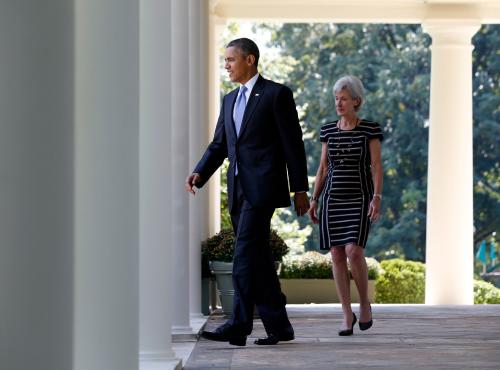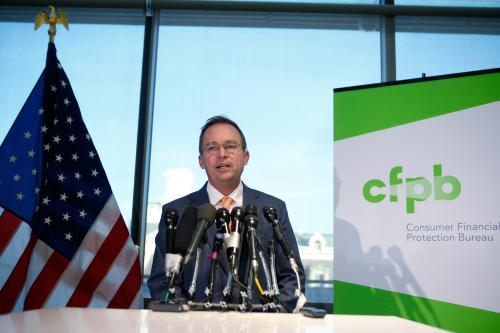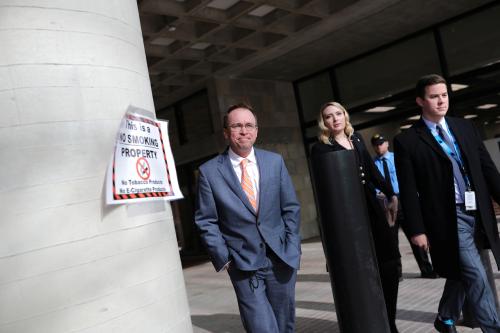This post is part of series by Brookings experts on Trump’s 1st State of the Union.
President Trump’s inaugural State of the Union address will be his opportunity to articulate his vision for this country under his leadership. So far, he has made it clear that his agenda favors some constituents—corporations and the uber-wealthy—over others. President Trump’s Consumer Financial Protection Bureau (CFPB) has apparently traded in consumer protection for Wall Street protectionist policies, a direction unlikely to change during his presidency. That said, it seems we are mostly left with wishful thinking.
Trump’s presidency is mired chaos and many are anxious for him to exhibit a modicum of competent leadership when he delivers his first State of the Union address. Surprisingly, consumer protection is an area where he can deliver bipartisan legislation. President Trump should remind Congress that middle-class economics is an essential part of his agenda and that consumer financial protection is a priority for this country. On January 30, President Trump has an opportunity to garner bipartisan support for consumer protections, a policy area where many Democrats and Republicans can genuinely find overlap.
Mick Mulvaney, Trump’s pick to lead CFPB, is implementing sweeping changes at the bureau at breakneck speed. With each successive decision, CFPB pivots further away from its core mission to prioritizing the financial services industry’s well-being over consumers. Since Mulvaney’s appointment, he has reversed course on payday lending, student loans, prepaid cards, and mortgage data. Mulvaney’s recently declined additional budget authority to fund the CFPB, which can only be interpreted as a thinly veiled intent to hamstring the bureau. Against this backdrop, the middle-class constituent is fading to the background.
Instead, President Trump could move to forestall the demise of consumer protections and provide a backstop for the middle class by convincing Congress that he will support legislation to reform CFPB’s leadership and transition the agency to a five-member commission governance structure. Republicans rejected a single-director structure since Cordray’s infamous 2012 recess appointment; they were exceptionally united in their calls for a democratizing bureau decisions through a board or commission mechanism “to ensure accountability and provide normal checks and balances.” So, it would be surprise if a Republican-controlled Congress finds trouble supporting such a plan. Collectively, Mulvaney’s changes and former Director Richard Cordray’s rules, demonstrate the weakness in a single-director structure for the Bureau. Under both leaders the regulation and enforcement pendulums swung forcefully between two ideological extremes, resulting in turmoil.
President Trump, a self-proclaimed astute businessman, should acknowledge that substantial shifts in regulations amplify operational risk and undermine business profitability. He could then use this national moment to educate Congress on the art of negotiation, which enjoins compromise (notoriously absent in the government shutdown) and present a clear roadmap for an independent, commission-governed CFPB. Senator Elizabeth Warren and others will need to weigh the cost of their hard, ideological stances to protect the CFPB in a zero-sum game against the bureau’s accomplishments to date—$29 billion returned to harmed consumers. Similarly, Representative Jeb Hensarling (R-Tex.) needs to reconcile a diminished CFPB with faint rumblings from the financial services industry regarding worries about swaying too far from sensible regulation. President Trump should take the position that a more deliberate, commission-led CFPB is a compromise that will secure long-term stability for the middle-class and responds to Republican’s insistence on reforming the “overreaching” agency.
Director Mulvaney is now inviting comments from the public on CFPB’s appropriate role. And, given his record, it is conceivable that he might selectively interpret comments to support his hypothesis: Shackling CFPB serves in the best interest of American consumers. In his State of the Union Address, President Trump should demonstrate leadership on consumer protections and remind Congress that agency independence can be efficiently balanced with political accountability; the art of the deal lies in the agency’s current structure.
Considering the polarized place in which we find ourselves at this moment; offering a compromise on CFPB’s leadership might not be unpalatable. Consumer protection may be the one issue where Democrats and Republicans can maturely agree—and President Trump can claim credit for the outcome.









Commentary
Trump’s 1st State of the Union: How he could lead on the Consumer Financial Protection Bureau
January 26, 2018